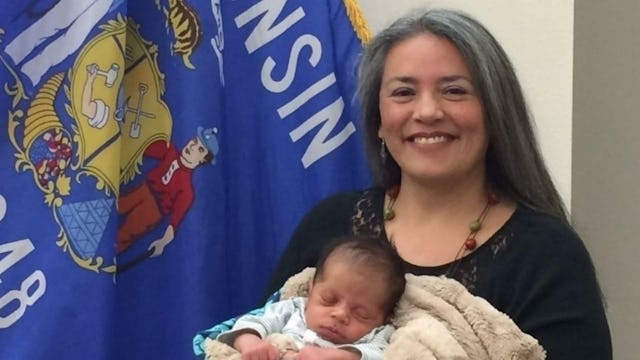Lawmaker Banned From Breastfeeding During City Council Sessions

Eau Claire, Wisconsin, city councilwoman Catherine Emmanuelle has been effectively banned from breastfeeding during city council meetings because other lawmakers complained that they were “distracted.”
As of late this week, a petition started by the organization MomsRising supporting the councilwoman’s right to breastfeed had garnered over 14,000 signatures and was one of multiple petitions circulating online. Supporters and lawmakers across the country got the hashtag #StandwithCatherine trending on Twitter.
Emmanuelle first brought her son to council sessions when he was just 9 days old and breastfed him from the audience. After almost 11 months, Emmanuelle decided that not being able to sit with her colleagues on the dais was keeping her from fulfilling her duties to the citizens of Eau Claire. After consulting a lawyer to see if there would be anything to keep her from doing her job and taking care of her infant, she felt secure that a 2010 Wisconsin state statute guaranteed her right and the right of all women to breastfeed:
“Breastfeeding is distracting.”
Eau Claire city council members opposing Emmanuelle’s right to breastfeed from her official seat said that breastfeeding violated their “standards of decorum.” Kerry Kincaid, council president, told the councilwoman that four council members had complained about her breastfeeding, and during a somewhat testy public hearing on the matter, fellow councilwoman Kathy Mitchell said that a child would be a distraction.
However, no one was able to qualify how it would be more distracting to have Emmanuelle in her official seat, which is, like other council members, on the small, raised stage, rather than a few rows back in the audience. The only real difference was her having access to a microphone and the ability to speak her mind.
In order to try to avoid coming into direct conflict with the state statute protecting breastfeeding mothers’ rights, council members decided to ban children from being in the area where the city council sits. By doing so, they specifically were trying to make it impossible for Emmanuelle to breastfeed her child in that area.
Pumping is not an option.
“Why didn’t she just decide to pump?” you may ask. In a status update on Facebook prior to the passage of the ban, Emmanuelle outlined why pumping was not a good option: “Pumping is not always practical during a legislative session – as I would have to leave the room and be away from the discussions/votes for a long period of time. I also ruled out the idea for myself that I would actively use my pump at my seat (my machine is noisy! And if you’ve pumped you know that machine talks ).”
Women lawmakers bring important perspective.
Cities like Boston and Washington, DC, have experienced baby booms, as parents of younger children have won seats on their city councils. In those cities, having parents of very young children (many of whom accompany their parents to meetings) has inspired new laws to benefit children and families. The Washington, DC, city council has seen numerous laws introduced to increase access to affordable child care, and even to provide baby boxes to all new mothers in the city. Boston’s first Asian American city council member, and first woman to give birth while on the council, Michelle Wu, tweeted her support for Emmanuelle.
In her case, having a baby while serving on city council made her push for paid family leave for all city employees.
Erin Forrest, the director of Emerge Wisconsin, an organization that trains and prepares progressive women candidates to run for office, sees this as an important issue across the nation. “Women’s voices are valuable, and our perspectives need to be represented at tables where decisions are being made. Women are still underrepresented in public office and we need to make it easier, not harder for women to serve their communities. Women are entirely capable of being moms and serving, and there is nothing shameful or distracting about women nursing their babies.”
The debate about breastfeeding in public still has a long way to go in the U.S., despite the fact that 49 states have laws in place to protect it (with the exception of Idaho), and the CDC and all major health organizations agree that breastfeeding can be hugely beneficial to both women and babies, if they choose to and are able to do it.
Women cannot afford to choose between work and family.
Many women in this country cannot afford to choose between feeding their babies and their careers. According to a 2016 Pew Research study, women are primary breadwinners for 40% of all families with children. Combined with the fact that the U.S. is the only country out of the 41 developed nations surveyed to not require paid parental leave, women are being forced to choose between doing what they feel is best for their babies and families and being able to provide for them financially.
You’ve got to do what you’ve got to do.
Across the world, women legislators have shown that breastfeeding should not preclude them from public service. A member of Iceland’s parliament, Unnur Brá Konráðsdóttir, explained, “[My child] was hungry, and I wasn’t expecting to speak, so I started feeding her. Then a representative asked a question about a proposal I had put forward, which I had to answer. I could choose to yank her off and leave her crying with another representative, or I could bring her with me, and I thought that would be less disruptive.” “[Breastfeeding is] the most natural thing in the world,” she later said. “It’s like any job, you’ve got to do what you’ve got to do.”
And as most moms know, a fed baby is a happy baby, and a woman who is engaged in meaningful work can bring important perspective to the jobs of being a public servant and a mother.